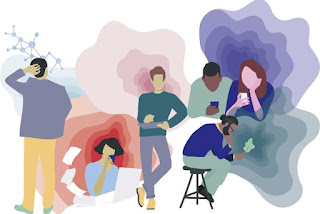What Are the Warning Signs of Suicide and How Can You Intervene?
Suicide is a tragic consequence of untreated mental health
issues, and recognizing the warning signs can save lives. Many individuals
contemplating suicide exhibit subtle or overt signs that they are struggling.
Understanding these indicators and knowing how to intervene can make a critical
difference. If you or someone you know is facing such challenges, reaching out
to a psychiatrist in Bhopal can provide the necessary support
and care.
Warning Signs of
Suicide
1) Verbal Expressions
of Hopelessness
Statements like “I can’t go on,” “I feel like a burden,” or
“Life isn’t worth living” are clear red flags. These remarks should never be
dismissed as mere attention-seeking behavior.
2) Withdrawal from
Social Connections
Individuals may isolate themselves from friends, family, and
social activities. This withdrawal often stems from feelings of worthlessness
or overwhelming despair.
3) Sudden Mood
Changes
Unexplained mood swings, such as going from extreme sadness
to sudden calmness, could indicate that a person has decided to take their own
life.
4) Giving Away
Belongings
Distributing prized possessions or settling financial and
personal matters may signify that the individual is preparing for their
absence.
5) Engaging in Risky
Behaviors
Increased use of alcohol or drugs, reckless driving, or self-harming
actions are alarming signs that someone may be struggling with suicidal
thoughts.
6) Physical
Changes
Poor personal hygiene, changes in eating habits, or sudden
weight loss/gain can indicate emotional distress.
How to Intervene
1) Listen Without
Judgment
If someone shares their feelings, listen with empathy and
without dismissing their pain. Sometimes, just being heard can provide immense
relief.
2) Ask Direct
Questions
Don’t hesitate to ask, “Are you thinking about hurting
yourself?” Contrary to popular belief, this does not encourage suicide but
shows you care.
3) Encourage
Professional Help
Gently suggest consulting a mental health expert, such as a
psychiatrist in Bhopal, who can provide therapy or medication tailored to their
needs.
4) Be Present
Offer consistent support, whether through regular check-ins
or accompanying them to therapy sessions.
5) Emergency
Action
If the risk is immediate, don’t leave the individual alone.
Contact a trusted adult, a crisis hotline, or emergency services for immediate
assistance.
A Lifeline of Hope
Suicide is preventable. By recognizing the warning signs and
intervening compassionately, you can help someone find hope and healing. A psychiatrist in Bhopal can provide expert guidance and a
path to recovery, ensuring no one has to face their struggles alone.



Comments
Post a Comment